
Back in 1979 when it was first written, August Wilson’s Jitney was a contemporary slice of African-American life as lived in Pittsburg, PA, and the first of a projected series of ten plays, each set in a different 20th Century decade. By the time Wilson completed his ambitious labor in 2005 with Radio Golf (set in the ‘90s), Jitney had morphed into a period piece, perhaps even more noteworthy for the look back in time it now offered.
The Pasadena Playhouse concludes its 2011-12 season by bringing Los Angeles audiences the South Coast Repertory revival of the first of Wilson’s Pittsburgh Cycle—direct from its unanimously lauded Orange County run.
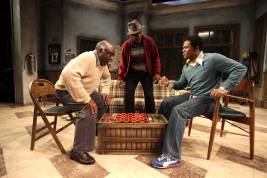 In its opening scenes, Jitney introduces us to jitney station owner Becker and employees Turnbo, Youngblood, Fielding, and Doub, a quartet of locals who drive these unlicensed taxicabs in the Pittsburg Hill District, cultural center of Pittsburg’s African-American community, but an area which regular cabs refuse to service. Also introduced in Act One are jitney regulars Shealy, a numbers taker who uses the station as his base, Philmore, a doorman at a local hotel, and Rena, Youngblood’s attractive young girlfriend. Last to appear is Becker’s 40something son Booster, whose release from prison after twenty years of incarceration propels Jitney’s most compelling storyline.
In its opening scenes, Jitney introduces us to jitney station owner Becker and employees Turnbo, Youngblood, Fielding, and Doub, a quartet of locals who drive these unlicensed taxicabs in the Pittsburg Hill District, cultural center of Pittsburg’s African-American community, but an area which regular cabs refuse to service. Also introduced in Act One are jitney regulars Shealy, a numbers taker who uses the station as his base, Philmore, a doorman at a local hotel, and Rena, Youngblood’s attractive young girlfriend. Last to appear is Becker’s 40something son Booster, whose release from prison after twenty years of incarceration propels Jitney’s most compelling storyline.
It took this reviewer a while to get into Jitney, the result of a particularly talky script, a large number of characters introduced in a short period of time, and a vernacular that occasionally challenged my listening comprehension. It wasn’t until Booster’s arrival in the fourth of the play’s eight scenes that Jitney began to grab me, but from that point on, Wilson’s dramatic storylines, Ron OJ Parson’s expert direction, and some truly superb performances held my attention all the way through to the play’s poignant final moments.
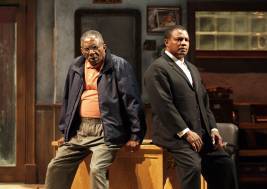 Not surprisingly, it is Charlie Robinson’s towering portrayal of Beckett that provides Jitney with its invaluable linchpin. Whether chiding Turnbo for his nosey parker attitude or responding to Doub’s criticisms of the way the jitney station is run or stepping in to break up a fight between Youngblood and Turbo or confronting his son about the crime that sent the younger man to the penitentiary for so many years, Robinson is a veritable force of nature and more than deserving of the opening night audience’s standing ovation.
Not surprisingly, it is Charlie Robinson’s towering portrayal of Beckett that provides Jitney with its invaluable linchpin. Whether chiding Turnbo for his nosey parker attitude or responding to Doub’s criticisms of the way the jitney station is run or stepping in to break up a fight between Youngblood and Turbo or confronting his son about the crime that sent the younger man to the penitentiary for so many years, Robinson is a veritable force of nature and more than deserving of the opening night audience’s standing ovation.
As Booster, a sensational Montae Russell give as good as he gets in Jitney’s pivotal father-son confrontation, a knock-down, drag-out that’s sure to have audience members debating the pros and cons of each man’s arguments at intermission.
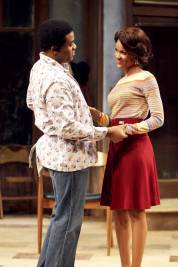
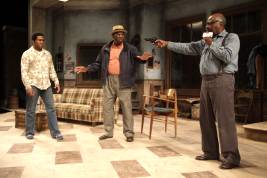
The lovely Kristy Johnson does standout work as Rena, thwarting attempts by Turnbo (an excellent Ellis E. Williams) to lure her from Youngblood (an equally splendid Larry Bates), berating Youngblood for running around with her sister, and reacting to the real reason boyfriend and sister have been spending so much time together.
James A. Watson does terrific work as Doub, the inevitable thorn in Becker’s side. David McKnight proves a scene-stealer as the wily, alcoholic Fielding, always looking for ways to play one angle or the other. Rolando Boyce (Shealy) and Gregg Daniel (Philmore) complete the cast in stellar fashion.
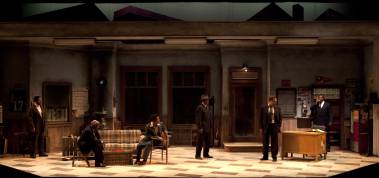 The SRC/PP design package couldn’t be more of a stunner, beginning with Shaun Motley’s beautifully conceived and detailed set, with its dingy walls and ragtag furniture, its vintage pay phone and coke machine, and its grimy windows through which we observe the many comings and goings of jitney station drivers and passengers.
The SRC/PP design package couldn’t be more of a stunner, beginning with Shaun Motley’s beautifully conceived and detailed set, with its dingy walls and ragtag furniture, its vintage pay phone and coke machine, and its grimy windows through which we observe the many comings and goings of jitney station drivers and passengers.
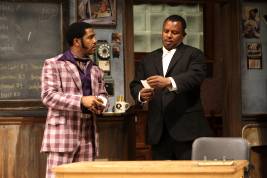 Dana Rebecca Woods’ costumes bring back the ‘70s in all their gorgeous awfulness, i.e. plenty of polyester, wide collars and lapels, and a purple plaid suit for Shealy that scores the evening’s biggest, longest, and most deserved laugh. Brian J. Lilienthal’s superbly varied lighting design features (among other things) banks of overhead fluorescent lights just as you’d expect in a place like Becker’s. Hit songs of the era are spotlighted in Vincent Olivieri’s richly evocative sound design, including Stevie Wonder’s “Signed, Sealed, Delivered I’m Yours,” which turns into an impromptu audience sing-along. Fight choreographer Ken Marckx creates a realistic tussle or two.
Dana Rebecca Woods’ costumes bring back the ‘70s in all their gorgeous awfulness, i.e. plenty of polyester, wide collars and lapels, and a purple plaid suit for Shealy that scores the evening’s biggest, longest, and most deserved laugh. Brian J. Lilienthal’s superbly varied lighting design features (among other things) banks of overhead fluorescent lights just as you’d expect in a place like Becker’s. Hit songs of the era are spotlighted in Vincent Olivieri’s richly evocative sound design, including Stevie Wonder’s “Signed, Sealed, Delivered I’m Yours,” which turns into an impromptu audience sing-along. Fight choreographer Ken Marckx creates a realistic tussle or two.
Casting is by Joanne DeNaut, CSA. Jamie A. Tucker is stage manager, Joe Witt production manager, Brad Enlow technical director, and Kristen Hammack company manager.
August Wilson’s Jitney closes one of the finest Pasadena Playhouse seasons in years, especially gratifying to those who mourned the closing of its doors less than three years ago. Though the postponement of Sleepless In Seattle The Musical—originally scheduled for Jitney’s early summer slot—to June 2013 proved a disappointment to this reviewer, its delay has prompted this coproduction of my two favorite Los Angeles/Orange County regional theaters, a collaboration that Pasadena Playhouse Artistic Director Sheldon Epps and his SCR counterpart Marc Masterson might consider continuing in future seasons as a way to treat patrons of both theaters to the best that each has to offer. Los Angeles-area theatergoers can count themselves fortunate that Jitney has made the trip north.
Pasadena Playhouse, 39 South El Molino Ave., Pasadena.
www.pasadenaplayhouse.org
–Steven Stanley
June 24, 2012
Photos: Henry DiRocco


 Since 2007, Steven Stanley's StageSceneLA.com has spotlighted the best in Southern California theater via reviews, interviews, and its annual StageSceneLA Scenies.
Since 2007, Steven Stanley's StageSceneLA.com has spotlighted the best in Southern California theater via reviews, interviews, and its annual StageSceneLA Scenies.







 COPYRIGHT 2024 STEVEN STANLEY :: DESIGN BY
COPYRIGHT 2024 STEVEN STANLEY :: DESIGN BY